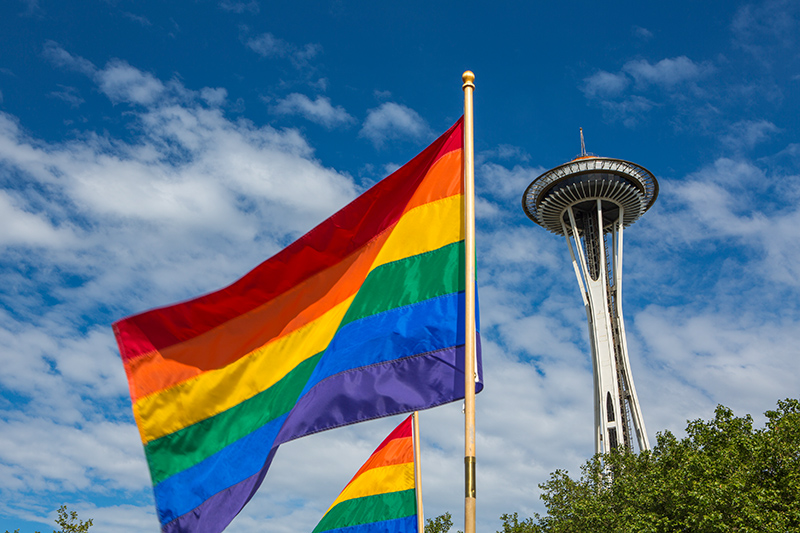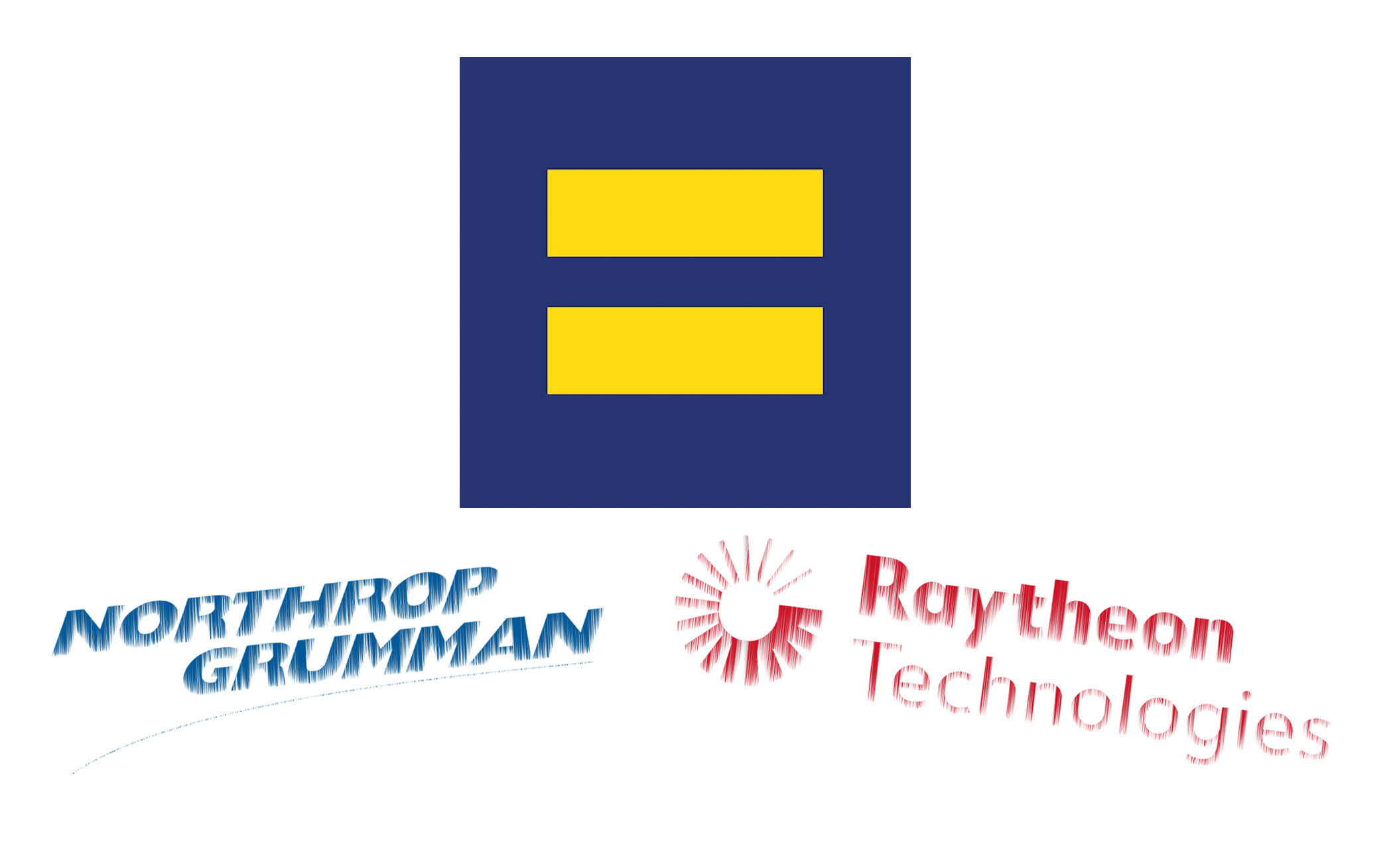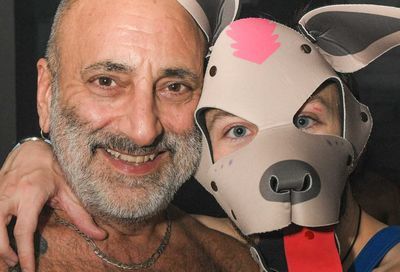Richard Grenell tells NBC News why Trump suddenly wants global decriminalization of homosexuality
But skeptics in the LGBTQ community are not convinced by the administration's latest proposal.

Feel free to call Luca Maurer a skeptic when it comes to U.S. foreign policy.
The program director for The Center for LGBT Education, Outreach & Services at Ithaca College, Maura has deep concerns about the State Department’s recently announced campaign to end the criminalization of homosexuality around the globe.
“I have questions about the details and how well thought out it is,” Maurer says, “and I have glaring questions about what the underlying purpose of it is.”
On Tuesday, the State Department announced that U.S. Ambassador to Germany Richard Grenell would lead the campaign, which will push foreign governments to stop imprisoning or executing self-identified LGBTQ people or those caught engaging in consensual same-sex conduct.
The campaign is seen by foreign policy experts as a way to leverage support for stricter U.S. sanctions against Iran by highlighting the country’s record of human rights abuses, including the recent hanging of a young gay man.
Following the announcement, Grenell met with 11 LGBTQ activists from European countries to discuss the campaign and its implementation — a move that Maurer seriously questions.
“This just seems like a way to broker and strategize around a completely different issue with Iran,” he said, “so it seems like an attempt to use an issue and use real people’s lives, in other areas of the world, in the service of this whole other political agenda that has nothing to do with LGBTQ rights.
“I’m very interested in what the goal is here. If the goal is decriminalization around the world, I’m a little surprised that this is the first time we’ve heard about it. If this, in and of itself, is a goal of the current administration, why now?”
According to the U.S. State Department, 71 nations criminalize homosexuality, meaning that those who engage in same-sex consensual relations can be charged and prosecuted to the fullest extent of the law. The sentence for homosexuality varies based on country, and can be as severe as life in prison.
The punishment is even worse in at least eight countries — Iran, Sudan, Saudi Arabia, and Yemen, as well as parts of Nigeria, Somalia, Syria and Iraq — which all carry the death sentence for homosexuality.
In an interview that aired on MSNBC on Wednesday, Grenell spoke with NBC reporter Josh Lederman — who first broke the story on Tuesday — about the campaign, which will involve many different arms of the State Department, including multiple embassies, the U.S. Mission to the European Union, and the Bureau of Democracy, Human Rights and Labor part of the State Department.
Grenell told Lederman he has been in contact with U.S. lawmakers to discuss the possibility of using U.S. economic aid as leverage to induce countries to change their law.
Lederman told Metro Weekly that the State Department is drawing a distinction between decriminalization and broader LGBTQ rights, such as same-sex marriage and workplace nondiscrimination protections.
“They’re really limiting this to whether or not you can be imprisoned, put to death, or otherwise punished for having same-sex activity,” he said. “They believe that by limiting it to that focus, they will be able to avoid a conflict between religious freedom and human rights.”

Lederman added that while LGBTQ activists would generally focus on policies that force transgender people to be sterilized, that infringe upon bodily autonomy, or interfere with people’s ability to survive or earn a living as part of a decriminalization initiative, at this time, U.S. officials are not including those aspects in their campaign.
“They’ve been portraying this as an extension of what is current U.S. policy,” said Lederman. “It has long been U.S. policy that countries should not punish people just for being gay, so they look at this as a new campaign to promote what has already been U.S. position.”
Lederman said that U.S. officials are telling NBC that they plan to emphasize the Universal Declaration of Human Rights, a United Nations document that was adopted in the late 1940s, as part of the campaign. This is significant, because nearly all the countries that currently criminalize homosexuality are signatories to the declaration, which provides an outline for what a policy that respects certain fundamental human rights should look like.
In his interview with Lederman, Grenell reiterated the narrow scope of the campaign and said he had “no concerns” about possible resistance from conservative religious groups, particularly American evangelicals, who have largely opposed recognition or expansion of LGBTQ rights.
“This is a bipartisan push,” he said. “People understand — religious people, individuals who may not always be in the LGBTI fight — they understand that criminalizing homosexuality is absolutely wrong. It is unbelievable to believe that in today’s world a 32-year-old man in Iran can be hanged simply for being gay. That’s unacceptable.”
Grenell, who is often touted as a possible U.S. Ambassador to the United Nations, also insisted that the campaign is much larger than its recent condemnation of Iran for LGBTQ rights abuses.
“This is not just about Iran,” he said. “This is about 71 countries, and Iran is one of them.”
In response to a separate inquiry from Metro Weekly, a State Department spokesperson confirmed that Grenell had met with 11 activists from different European countries to discuss the new campaign, while also insisting that it is a realization of, and not a departure from, longstanding U.S. policy as it relates to human rights.
“The policy from the beginning of this administration is that the United States firmly opposes criminalization, violence and serious acts of discrimination such as in housing, employment, and government services, directed against LGBTI persons. LGBTI persons have the same rights as any other persons in these respects,” the spokesperson said.
“Secretary [of State Mike] Pompeo was clear that he supports protections for the human rights of LGBTI persons. In May 2018, Secretary Pompeo stated: ‘Around the world, far too many governments continue to arrest and abuse their citizens simply for being lesbian, gay, bisexual, transgender or intersex. Fear and bigotry are enshrined in laws that criminalize LGBTI status or conduct in more than 70 countries. In some, being LGBTI is punishable by death. We use public and private diplomacy to raise human rights concerns, provide emergency assistance to people at risk, and impose visa restrictions and economic sanctions against those who persecute them.'”
LGBTQ activists’ responses ranged from hopeful to skeptical, but all agreed that they want to see more details about the campaign and how it will be implemented.
Jerri Ann Henry, president of the Log Cabin Republicans, says she is “thrilled” to see the administration pushing for decriminalization in other nations, while also noting that there is still work to be done in the United States and other countries where homosexuality isn’t criminalized.
“I would like to see this treated like many other human rights standards we hold, where if you go to work with the United States, in whatever capacity, whether it’s trade partnerships, or military or security alliances, you need to be on board with a baseline of human rights principles,” Henry says. “And executing somebody because of who they love is not in line with that.”
Asked about balancing religious beliefs with the push for decriminalization, Henry draws a distinction between individuals’ beliefs and state-sponsored action.
“People have the inherent right to believe what they believe. But that does not mean that the government can punish or execute people because of a difference of opinion,” she says. “We do that here in the United States as well. Not always perfectly, but in a way that ensures that people are allowed to believe without discrimination against others. It takes a lot of work to do it. And it’s hard. But there are a lot countries that have a lot of room before they even hit the hard parts. Right now, there’s some very basic things they could adjust.”
Henry also expresses hope that European and Western allies that have pro-LGBTQ laws will join the United States in pushing the decriminalization initiative, and that Congress will pass a statement or resolution supporting the effort.
“Nancy Pelosi has always stood up and said she’s an advocate for equality. I’d love to see her and the rest of the House to come together to stand with the administration on this push. This to me is something that should be nonpartisan,” Henry says. “I’d also love the business community to realize the importance of this, and look carefully at who they do business with. It takes every sector to really bring about change.”
But Jeremy Kadden, a senior international policy advocate for the Human Rights Campaign, expressed skepticism about the timing and motivation behind the new campaign, and blasted the administration for what he sees as past inaction when LGBTQ rights were being violated abroad.
“Donald Trump and Mike Pence have turned a blind eye to a campaign of violence and murder targeting LGBTQ people in Chechnya that has stretched on for two years. They have turned away LGBTQ people fleeing violence and persecution and sent them back to countries that criminalize them, and have consistently worked to undermine the fundamental equality of LGBTQ people and our families here at home from day one,” Kadden said in a statement. “If this commitment is real, we have a lot of questions about their intentions and commitments, and are eager to see what proof and action will follow.”
The Center’s Luca Maurer, who previously worked and volunteered in Namibia — where homosexuality is criminalized — knows the toll that stress and a constant level of fear can take on the lives and health of LGBTQ people in places where homosexuality is criminalized, calling its effects “very pernicious and far-reaching.”
But he also notes that LGBTQ people can suffer even in places where they no longer face prison or a death sentence, as in instances where they become victims of extrajudicial killings, are forcibly sterilized, and are subjected to extreme surveillance or discrimination in a way that impedes their ability to obtain a job, buy food, or survive.
As such, he says a narrowly-tailored initiative such as the one being pushed by the Trump administration doesn’t truly address some of the LGBTQ communities’ most pressing concerns.
Even though he supports decriminalization, Maurer questions whether the United States has the moral authority to dictate what policies other countries adopt. He notes that homosexuality was only fully decriminalized in the United States in 2003, well after other countries.
He also notes that the United States could be accused of hypocrisy, given some of the Trump administration’s domestic actions that target LGBTQ people and the refusal of the Trump-led Department of Justice to recognize protections for LGBTQ individuals under existing laws.
“It’s sort of unclear how some of the details are going to be worked out on this, especially since decriminalization efforts don’t particularly align with domestic policy and other efforts of the current administration, everything from an outright ban on transgender people in the military, to removing mentions of LGBTQ folks on US government websites, and the list goes on,” Maurer says.
But Grenell told NBC’s Lederman that he does believe the United States is in a position to lead on the decriminalization front. He also pushed back against claims by activists that the campaign does not go far enough in promoting LGBTQ rights.
“I think it’s really important that we focus on [decriminalizing homosexuality], that we can save the other fights for later,” he said.
Still, Maurer has reservations about what seems to be the apparent lack of representation from regions where the campaign will be carried out, namely the Caribbean, the Middle East, and Africa.
“I have a lot of questions when people and cultures are being discussed and none of the people or cultures are being brought to the table to speak from their own experience and for their own interests,” he says.
“There are huge differences between these regions of the world. I’m not sure how you formulate a plan to address decriminalization without addressing the disparate cultures and various factors at play in individual countries,” Maurer adds. “In order to talk about how broad the scope of this campaign should be, individuals who are on the ground in these targeted areas need to be part of the discussion, as well as the solution.”
Support Metro Weekly’s Journalism
These are challenging times for news organizations. And yet it’s crucial we stay active and provide vital resources and information to both our local readers and the world. So won’t you please take a moment and consider supporting Metro Weekly with a membership? For as little as $5 a month, you can help ensure Metro Weekly magazine and MetroWeekly.com remain free, viable resources as we provide the best, most diverse, culturally-resonant LGBTQ coverage in both the D.C. region and around the world. Memberships come with exclusive perks and discounts, your own personal digital delivery of each week’s magazine (and an archive), access to our Member's Lounge when it launches this fall, and exclusive members-only items like Metro Weekly Membership Mugs and Tote Bags! Check out all our membership levels here and please join us today!



























You must be logged in to post a comment.